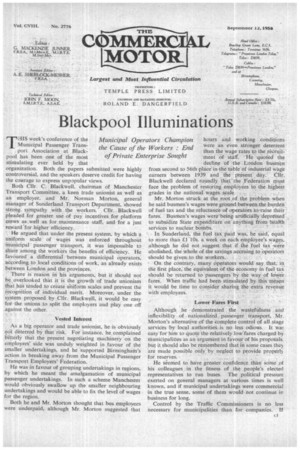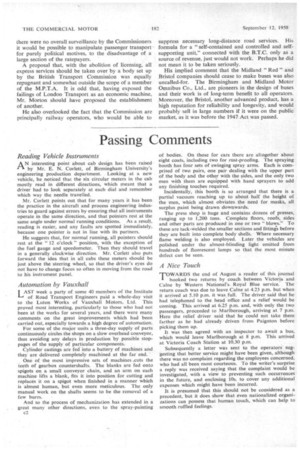Blackpool Illuminations
Page 37

Page 38

If you've noticed an error in this article please click here to report it so we can fix it.
Municipal Operators Champion the Cause of the Workers : End of Private Enterprise Sought
THIS week's conference of the Municipal Passenger Transport Association at Blackpool has been one of the most stimulating ever held by that organization. Both the papers submitted were highly controversial, and the speakers deserve credit for having the courage to express unpopular views.
Both Car. C. Blackwell, chairman of Manchester Transport Committee, a keen trade unionist as well as an employer, and Mr. Norman Morton, general Manager of Sunderland Transport Department, showed strong_ sympathy with, the _workers. Cllr. Blackwell 'pleaded for greater use of pay incentives for platform crews as . well as forinaintenance staff, anti for a just reWarcifor higher efficiency.
". He argued that under the present system, by which a uniform scale of wageS was enforced throughout Municipal passenger transport it was impossible to share among the workers the benefits of efficiency. He favoured a differential between municipal Operators, according to local conditions of work, as already exists between London and the provinces. There is reaion in his arguments, but it should not be overlooked that it is the growth of trade unionism that ha tended to create uniform scales and prevent the recognition of individual merit. Moreover, under the system proposed by _Cllr. Blackwell, it would be easy for the. unions to split the employers and play one off against the other. .
Vested Interest As a big operator and trade unionist, he is obviously not deterred by that risk. For instance, he complained bitterly that the present negotiating machinery on the employers' side was unduly weighted in ,favour of the Smaller undertakings, and he supported Birmingham's action in breaking away from the Municipal Passenger Transport Employers' Federation.
He was in favour of grouping undertakings in regions, by which he meant the amalgamation of municipal passenger undertakings. In such a scheme Manchester would obviously swallow up the smaller neighbouring undertakings and would be able to fix the level of wages for the region.
Both he and Mr. Morton thought that bus employees were underpaid, although Mr. Morton suggested that hours and working conditions were an even stronger deterrent than the wage rates to the recruitment Of staff. He .quoted •the decline of .the_ London busmen from second to 56th place in the table of industrial wage earners between 1939 and the -present day:, ClIr. Blackwell declared roundly that the ,Federation must face the problem of restoring employees to the highest grades in the national Wages scale.
Mr. Morton struck, at the root of the problem when he said busmen's wageswere ground-betWeen the burden' of fuel tax and the reluctance -of operators to:raise their fares: Busmen's wages were being artificially depressed to subsidize State expenditure' on-anYthing from lean services to nuclear bornbs. • . In Sunderland, the fuel .tax paid was, he said, equal to more than £1-10s. a. week on each employee's Wages, although he did not .suggest that if the fuel tax were abolished; the whole of the savings accruing to -operator's should be .given to. the workers. .
On the contrary ," many operators would say that in the :first place; the equivalent of the economy in fuel. tax should be returned to passengers 'by the Way of lowir fares. When traffic had been stimulated by. this means it would be time to consider sharing the extra revenue with employees.
Lower fares First Although he demonstrated the _ wastefulness and inflexibility of . nationalized ipassenger transport, .Mr. Morton's alternative of the complete control of all stage services by local authorities is• nO less odious. It wai easy for him to quote therelatively lbw :fares charged by municipalities as an argument in favour of his propoSals, but it should also be remembered that in some cases they are made possible only by neglect to provide properly for reserves.
He seemed to have greater confidence than sciine of his colleagues in the fitness of the people's elected representatives to run buses. The political pressure exerted on general managers at various times is well known, and if municipal undertakings were commercial in the true sense, some of them would not continue in business for long.
Control by the Traffic Commissioners is no less necessary for municipalities than for companies. If
. , . . • . „
there were no overall surveillance by the Commissioners it would be possible to manipulate passenger transport for purely political motives, to the disadvantage of a large section of the ratepayers.
A proposal that, with the abolition of licensing, all express services should be taken over by a body set up by the British Transport Commission was equally repugnant and somewhat outside the scope of a member of the M.P.T.A. It is odd that, having exposed the failings of London Transport as an economic machine, Mr. Morton should have proposed the establishment of another.
He also overlooked the fact that the Commission are principally railway operators, who would be able to suppress necessary long-distance road services. His formula for a "self-contained and controlled and selfsupporting unit," connected with the B.T.C. only as a source of revenue, just would not work. Perhaps he did not mean it to be taken seriously.
His implied comment that the Midland "Red " and Bristol companies should cease to make buses was also uncalled-for. The Birmingham and Midland Motor Omnibus Co., Ltd., are pioneers in the design of buses and their work is of long-term benefit to all operators. Moreover, the Bristol, another advanced product, has a high reputation for reliability and longevity, and would probably sell in large numbers if it were on the public market, as it was before the 1947 Act was passed.
























































































































